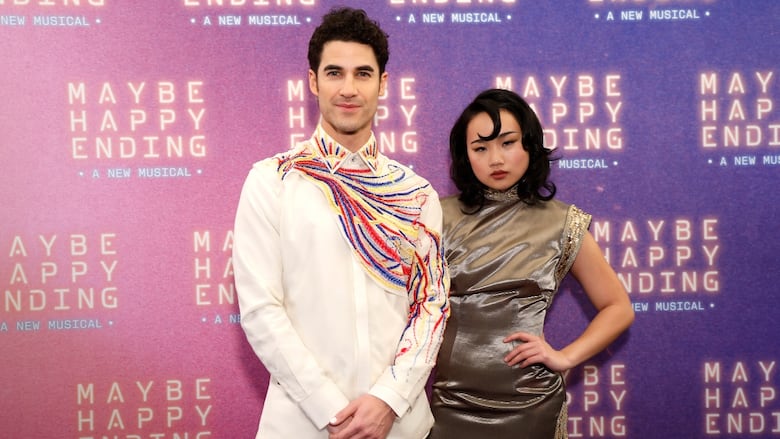What will Maybe Happy Ending's casting controversy mean for the show — and the industry?
Theatre critics Glenn Sumi and Joshua Chong discuss the Broadway musical’s recent backlash

The musical Maybe Happy Ending has made waves this season on Broadway.
Starring Darren Criss and Helen J. Shen, the unique new show is a comedy set in Seoul, South Korea that follows two robots as they find love at the end of their batteries.
At this year's Tony's it not only won the most awards, but it also broke ground, with lead actor Criss becoming the first Asian American to win best leading actor in a musical.
Recently, the tides have begun to turn for the show, however, as it receives backlash for its latest casting announcement. After Criss set his date to depart the show, the production announced a white actor, Andrew Barth Feldman, will be stepping into the lead role.
Today on Commotion, theatre critics Glenn Sumi and Joshua Chong join guest host Rad Simonpillai to talk about what Maybe Happy Ending's Broadway casting controversy could mean for the future of the show as well as the industry.
We've included some highlights below, edited for length and clarity. For the full discussion, listen and follow Commotion with Elamin Abdelmahmoud on your favourite podcast player.
Rad: Joshua, the two main characters are helper robots who are sent to live out the rest of their batteries at a robot retirement home. I mean, this is an eccentric premise, right?... Kind of this underdog narrative. So what is it that made this show such a big hit with audiences?
Joshua: It was so refreshing, after so many years of these jukebox musicals, to get a totally new, original musical. And the score was so special — jazz influences, hints of Sondheim. And it was refreshing to see a totally new musical be so successful on Broadway. I was in New York when it was in previews. People thought it was going to close after a few weeks. There were no big names — maybe Darren Criss, but he's not really an A-lister on Broadway — and for it to succeed was incredible. It's about robots and whether they can fall in love. It's a robot story: Wall-E, meets Up, meets Once, the musical. But it's a really human story as well about what we do with the rest of our lives.
Rad: OK. Glenn, let me talk about this backlash to Andrew Barth Feldman's casting. The creators of the musical responded with a middle-of-the-night Instagram post. They said that they wanted their show to be, and I'm quoting here, "comfortably performed by anyone, anywhere, yet distinctly set in Korea." What did you make of their statement?
Glenn: Yeah, I just think it's a little wishy-washy. I mean, in that statement, they said that every role could be played by an Asian performer, but without the intention that the robot roles always would be. I just think it is really wishy-washy. It's like wanting to have their cake and eat it too. I get it. Obviously, they want it to work internationally and on tour; that's how you make money.
I was trying to think of a comparison and I thought of you and film, Rad. So you know how the original script for Ridley Scott's Alien, Ripley was supposed to be played by a man. And then Sigourney Weaver comes in there. They didn't have to make a lot of changes to the part, but it made history, especially because there were virtually no action roles for women at the time. So what if Alien had been a big success, and then in the sequels, Ripley was changed back to a man. I mean, that's sort of how it feels.
Rad: That upsets me already. You knew exactly how to cut right to my core.
Joshua, there's actually another layer to this that's complicating all of this. And that's the lead actress, Helen J. Shen, is in a relationship with Andrew Barth Feldman, who took on this role. So what has she said about this?
Joshua: It's so complicated for her, and she actually posted about this shortly after this controversy erupted. She acknowledged the pain that the Asian community is feeling and understands that a lot of people saw this production as an opportunity for Asian actors, especially male actors, who did not have these opportunities previously. But she also said it's complicated because she is in a relationship with Andrew, and she said it is going to be a joy to play opposite him eight times a week, for these nine weeks that he's in the production.
You can listen to the full discussion from today's show on CBC Listen or on our podcast, Commotion with Elamin Abdelmahmoud, available wherever you get your podcasts.
Panel produced by Jane van Koeverden.